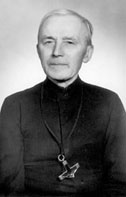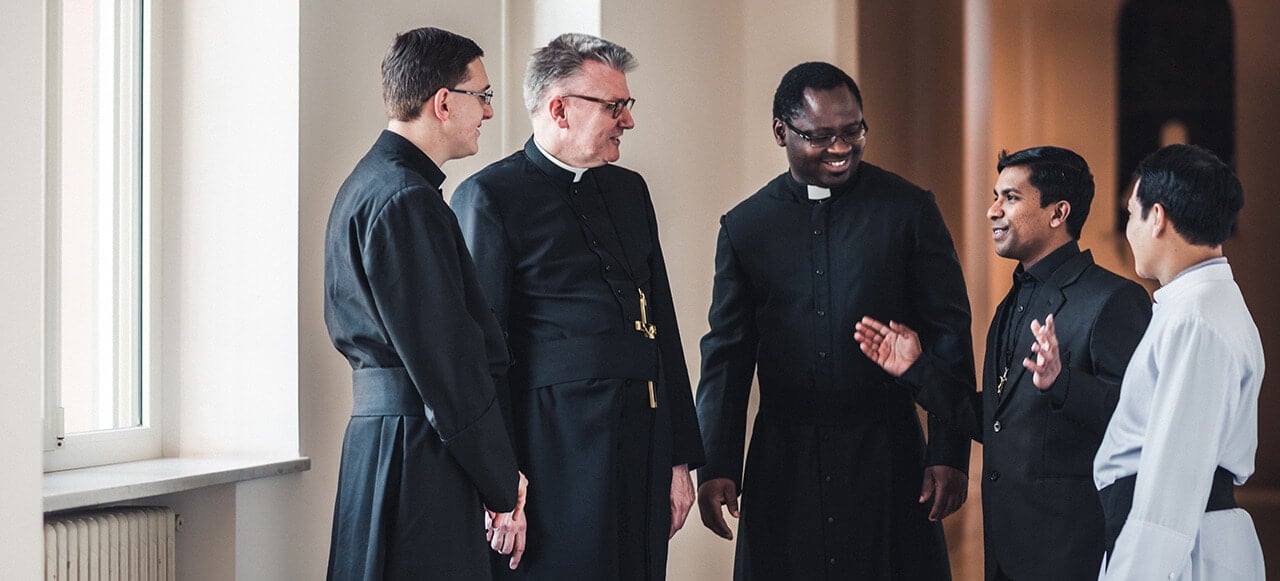
His life (1866-1947)
He was born in Dzierzanow, in the diocese of Poznam, on June 4, 1866. After being employed for a few years as blacksmith, he entered the Oblates in 1891, and five years later, was sent to Western Canada. His first assignment was at the mission of LaBiche Lake, where he was victim of a terrible accident while working at the local sawmill. He became entangled in a moving belt. His right arm was brutally crushed and the doctors had no choice but to amputate. Despite this handicap Brother Antoine lived fifty more years. At the Saint Jean Juniorate in Edmonton, he led a very active life and became a model of courage, humility, and piety for hundreds of students. On July 10, 1947, he died at the age of eighty one. He left a reputation of great sanctity. In April 1952, the first canonical steps were taken towards his beatification.
“Me, say an Ave”
Father Breton admits that he hesitated before entitling his book Forgeron de Dieu. Brother Antoine had developed such a devotion to Mary that he could have been presented to readers as a sower of “Aves”. But the author explained his choice: “I wanted to bring out especially the virile aspect of his spiritual life. This humble Brother was not satisfied with a mere recital of frail “Aves” wrapped in sentimentality. He lived a rude existence, like the life of a blacksmith. He struggled and suffered. He had to hammer his soul with sacrifices, trials, and self-denials.”
Nevertheless, Brother Antoine had extreme confidence in the Blessed Virgin. He entrusted all his tasks and all his difficulties to her. His sorrows, his joys, his personal intentions and those of others would invariably come to Mary. Since he had difficulty with the French language he would simply promise: “Moi, dire un avé” (Me, say an “Ave”). I have already written in the Apostolat about his adventure with a herd of swine, how he succeeded in leading them across a field of beautiful oats without the least damage to the crop, thanks to the “Aves” that he had recited beforehand. Another example follows of his power of intercession.
Bogged down
On a June day, in 1896, a caravan of eleven wagons, laden with all kinds of provisions, was traveling towards Labiche Lake. It had been raining abundantly for one month. The roads were wet and gutted with deep ruts. Progress was painful. Occasionally, six horses were required to free one wagon from the mud. At the foot of an incline, the first conveyance again became mired in the mud. The travelers were immobilized by a large swamp of some hundreds of feet. Everyone was questioning how they could extricate themselves this time. However, Brother Antoine had already jumped from his wagon, and was wading through the swamp. Up to his knees in water, he moved forward holding a small branch and a holy card in his hand.
Upon arrival at other side, he knelt on a mound and began to recite “Aves.” A half-hour went by and he remained in prayer. The drivers began to grumble. “All this time was wasted. Does he think he can free us from here with prayers?” Father Henri Grandin spoke up in his defense: “My good friends, don’t make fun of him. This little Brother is a saint.” One hour later, the Polish Brother rose to his feet. He yelled to the travelers: “Now is time, you cross.” Forward! All get ready. Surprise! The wheels turn as if the wagon were on solid ground. In less that fifteen minutes, the entire caravan had crossed the swamp without trouble. “You see,” said Father Garin, “you had no reason to grumble against this little Brother.” “That’s true, but how did we know that he was a saint?”
André DORVAL, OMI
